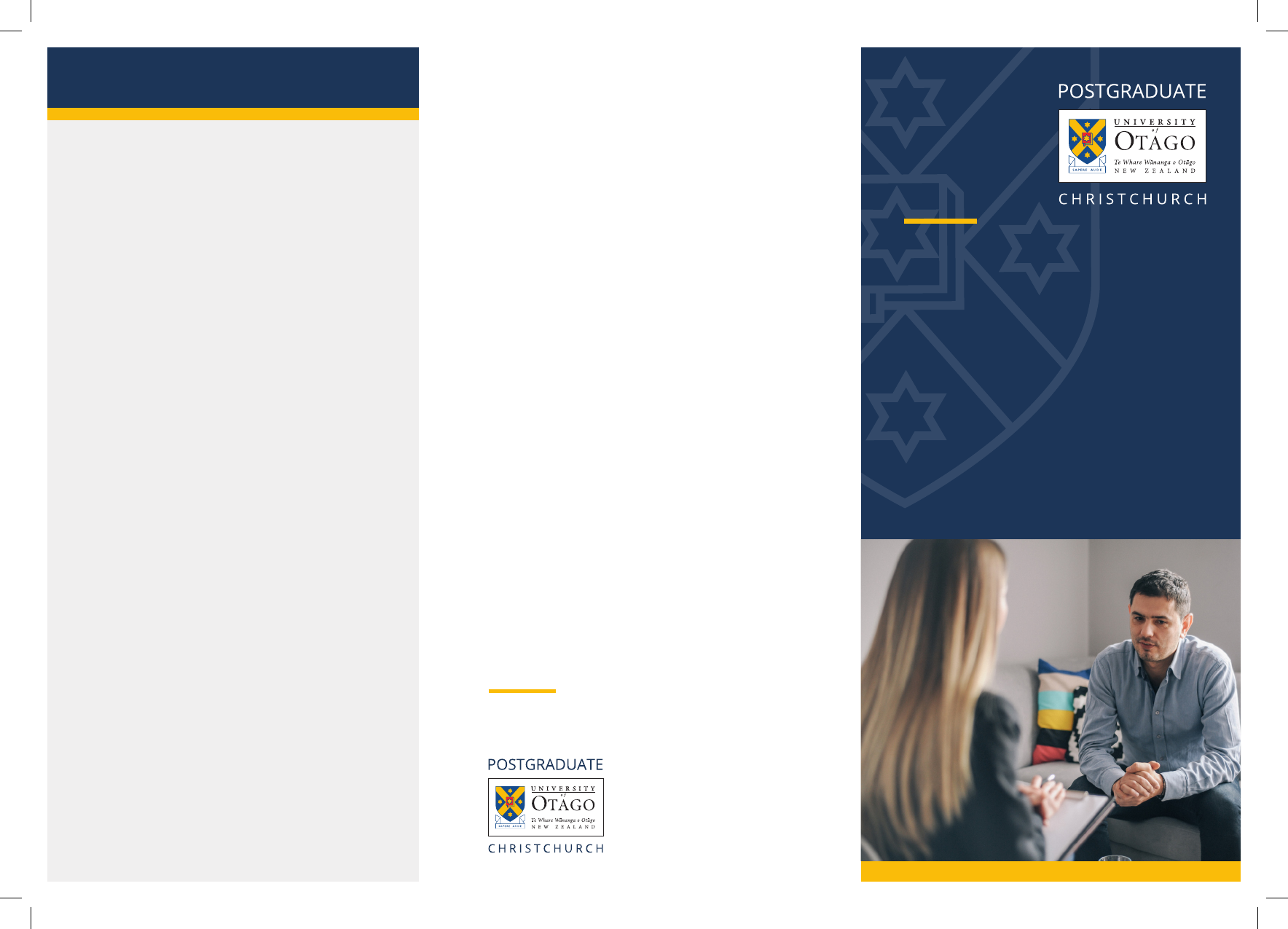
M00935-GR-20220530
For information relating to admission and
enrolment, contact:
Co-ordinator, Student Experience
University of Otago, Christchurch
Email [email protected]
otago.ac.nz/christchurch/psychmed
Department of Psychological Medicine
University of Otago, Christchurch
Postgraduate
Certicate in
Health Sciences
(Forensic
Mental Health)
About the department
The Department of Psychological Medicine
(Christchurch) has a strong history of leadership in
clinically applied mental health teaching and research.
It comprises a mix of joint clinical/academic, research
fellow, teaching fellow and administrative sta. Our
joint clinical sta represent a range of professional
disciplines, and many have leadership roles within local
services as well as national professional roles.
Residing within the department are the Clinical Research
Unit, the National Addiction Centre and the world-
renowned Christchurch Health and Development
Study. Our department’s Psychiatric Registrar training
programme has a strong reputation across Australasia.
PSME 401 Nature, Extent and Assessment
of Mental Disorders
Convenor: Associate Professor Caroline Bell
This paper covers the symptomatology, aetiology,
epidemiology and assessment of the common mental
disorders of children, adults and the elderly.
NURS 403 Mental Health Nursing Practice
Convenor: Dr Dave Carlyle
This paper focuses on assessment, clinical reasoning and
formulation, and psychotherapeutic interventions in nursing
practice.
PSME 404 Addiction Assessment
Convenor: Associate Professor Simon Adamson
This paper covers the clinical assessment and treatment
planning for people who present with addiction and related
mental health problems.
PSME 439/NURS 433 Intellectual Disability:
Theory into Practice
Convenor: Dr Henrietta Trip
This paper introduces the application of philosophical
frameworks within practice to support people with
intellectual disability to optimise health, behavioural
challenges and service access across the lifespan.

Core skills for assessing and treating people with mental health problems who are at risk of
oending, delivered by national clinical and academic leaders in forensic mental health.
PSME 407 Forensic Psychiatry
Convenor: Associate Professor James Foulds
Course structure:
PSME 407 comprises two compulsory two-day workshops
in Christchurch (July and October) plus two compulsory
two-day Zoom webinar workshops in August to September.
These contact teaching sessions are complemented by
self-directed learning, assisted by a study guide; reading
lists; online discussions; and the provision of online learning
resources. The workshops are led by a range of leading New
Zealand forensic mental health professionals and speakers
from related elds.
Students also experience peer to peer learning by
participating in course activities with classmates from a
range of professional groups, geographic locations, service
types and diverse cultures.
Course content:
Forensic psychiatry is characterised by the salience of
violence risk assessment and management with the
therapeutic use of physical, procedural and relational
security. It provides mental health expertise at the interface
between the mental health and correctional, courts and
related systems.
This paper examines key aspects of forensic mental health
structured around eight themes:
• Foundations: Including the historical development
of forensic services within New Zealand; the consumer
perspective; ethical issues pertaining to forensic
psychiatry; and cultural aspects of forensic mental health
care in New Zealand, with specic reference to Māori.
• Violence risk assessment: Including the association
between mental disorder and violence; clinical risk
assessment; actuarial approaches to risk assessment;
and issues relating to the impact of personality, alcohol
and substance use on risk.
• Legal: Including health information, privacy and
professional risk; forensic aspects of the Mental Health
(Compulsory Assessment and Treatment) Act 1992
and the Criminal Procedure (Mentally Impaired
Persons) Act 2003; the insanity defence;
tness to stand trial; and the role of the expert
witness in report-writing and giving evidence.
• Systems: Including mentally abnormal homicide and
high-risk patient systems, and challenges in the
provision of inpatient and outpatient mental health care
by the regional forensic mental health services.
• Prison: Including therapeutic approaches to mental health
in prisons; risk assessment in the prison system; provision
of mental health care in prison systems; and sex oender
treatment programmes.
• Personality: Including examination of conduct disorder
and forensic implications; neurobiology of aggression;
personality disorder; and psychopathy.
• Special populations: Including consideration of intellectual
disability and oending behaviour; women in forensic
psychiatry; youth forensic services; and psychological
approaches to violent oending.
• Impact: Including consideration of the impact of violent
oending on perpetrators; and the impact of exposure
to materials related to violent oending on mental health
professionals.
Course Material
Detailed course materials will be made available via the
University of Otago’s Moodle and eReserve online platforms.
Assessment
There are two assessments for PSME 407: an essay (50%)
and a written exam (50%).
The Postgraduate Certificate comprises:
One compulsory 30-point paper: PSME 407 Forensic
Psychiatry.
Plus ONE of the following approved 30-point papers:
• PSME 401 Nature, Extent and Assessment
of Mental Disorders
• NURS 403 Mental Health Nursing Practice
• PSME 404 Addiction Assessment
• PSME 439/NURS 433 Intellectual Disability:
Theory into Practice
Who is the certificate aimed at?
Professionals working with people with mental health
problems who are involved with the criminal justice system.
These groups include health professionals working in
mental health settings (including regional forensic services),
sta working in correctional settings, and justice and law
enforcement professionals. The programme is aimed mainly
at the New Zealand jurisdiction and is expected to attract
students from throughout New Zealand.
Students enrolling in these papers or this programme may
be eligible for funding. This will be considered once your
application is received.
When is it taught?
PSME 407 is taught in semester 2, July–November
PSME 401, NURS 403, PSME 404 and PSME 439/NURS 433 run
in semester 1, February–June
The two papers can be completed in either order. Papers
do not need to be completed within consecutive semesters,
although this is encouraged.
